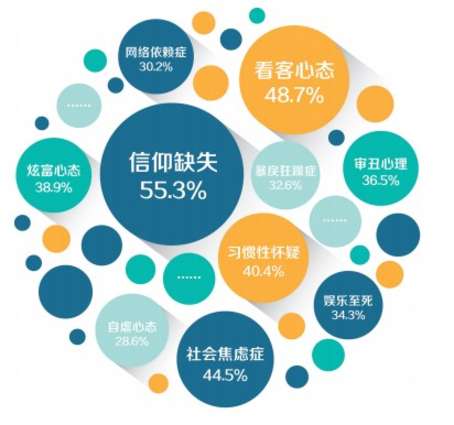People’s Tribune, a magazine published by the official People’s Daily, released a survey on social ills afflicting contemporary China. The Wall Street Journal summarizes the results, which found a lack of “credibility” among officials to be the gravest public concern.
Although the survey showed ten top-ranking social ills, People’s Tribune asked about 13 problems in total. “Self-abuse,” a sort of masochism involving “criticism of the Communist Party,” was also highlighted as a major problem. From NetEase [Chinese]:
The People’s Tribune Questionnaire Center recently put together a list of the 13 biggest social ills [in Chinese society]. One of the issues mentioned, “self-abuse,” refers to criticism of the Communist Party—and those who benefit most from within the system are criticizing the party the hardest. “Lack of faith,” “spectator mentality,” and “social anxiety disorder” ranked as China’s top three current social ills.
近日,人民论坛问卷调查中心整理出13种公众反映较多的社会病态,其中“自虐心态”指骂共产党、恨体制,甚至获得体制内好处越多的人骂得越凶。而“信仰缺失”、“看客心态”、“社会焦虑症” 位列当今社会病态前三项。
[…] In general, Chinese society has been functioning very well—a wave of anti-corruption is sweeping over the land, society has taken the eight-point guidelines [for official conduct] deeply to heart, China’s economy continues to develop steadily, and life in general is standardized and orderly. However, because of the incredibly dramatic societal transformation that China is going through, all of the overlapping aspects of China’s social structure, lifestyles, modes of behavior and values are changing. Some maladjustment and disharmony is inevitable. This has caused social ills to become prominent issues during this modernization transformation process. Social ills are social abnormalities that differ from China’s social norms or healthy state; they are an overall summation of the problems, contradictions, conflicts, confusion, and other phenomena present in society. Through in-depth surveys, sifting, and refining, the People’s Tribune Questionnaire Center has put together the following preliminary list of the 13 most commonly reflected social ills.
[……]当前,中国社会总体运行状况良好,反腐之风正紧、八项规定深入人心、经济发展持续稳定、生活规范有序,但由于中国正经历急剧的社会转型,社会结构、生活方式、行为方式和价值观念等各方面交叠变化,难免有诸多不适应、不协调,这也使得社会病态成为中国现代化转型过程中的突出问题。社会病态是社会常态或者健康状态的反常状态,是对社会中存在的问题、矛盾、冲突、混乱等现象的总体概括。人民论坛问卷调查中心通过深入调查采访和梳理提炼,初步整理出如下13种公众反映较多的社会病态。
Death by Entertainment: Worship of personal hedonism, willingness to became a slave to entertainment.
娱乐至死:崇尚个人享乐主义,心甘情愿地成为娱乐的附庸;
Spectator Mentality: Ah Q-style apathy, numbness and spectatorship; following the life philosophy that “if it doesn’t concern me, I won’t be concerned with it.”
看客心态:阿Q式的冷漠、麻木与围观,崇尚“事不关己高高挂起”处世哲学;
Habitual Suspicion: Overall suspicion due to both the lack of trust between people and the lack of sense of safety, caused by society’s trust crisis.
习惯性怀疑:社会诚信危机导致人与人之间缺乏信任和安全感,从而怀疑一切;
Appreciation for the Ugly: Scandal has become the hall pass for scandal mongers. The fake, evil, and ugly prevails. The more someone curses, the more popular he or she is.
审丑心理:丑闻成为丑闻制造者的通行证,假恶丑盛行、越骂越红;
Social Anxiety Disorder: Long-term stress and anxiety caused by work, life, taking care of the elderly, and other unpredictable issues.
社会焦虑症:因工作、生活、养老及未来无法预期等而长期紧张与不安;
Lack of faith: Crisis of faith and morality that exists with the diversification of values; moral deficit and moral default are magnified.
信仰缺失:价值多元化下存在信仰与道德有关的精神危机,道德赤字与坏账凸显;
Violent Rage: Brutality and perverse cruelty; irritability and tendency to go to extremes, even becoming a danger to society.
暴戾狂躁症:粗暴野蛮、乖张残暴,易怒且好走极端甚至危害社会;
“Ostrich Mentality”: Escapism, willful ignorance, attitude of evasion when faced with pressure and hardship.
“鸵鸟心态”:逃避现实,“掩耳盗铃”,面对压力与困难采取回避态度;
Fear of Thinking: Parroting others, repeating others’ words; thoughtlessly going along with rumors or others’ opinions.
思考恐惧症:鹦鹉学舌,人云亦云,对于谣言或他人观点,不假思索,附和跟风;
Internet Dependency: Addiction to the Internet and/or mobile media, resulting in dependency; becoming engulfed inside of virtual worlds, unable to pull oneself out.
网络依赖症:对网络及移动媒介上瘾,产生依赖,沉溺在虚拟世界中不能自拔;
Wealth Flaunting: Displaying, flaunting wealth; vanity; another manifestation of the inferiority complex. Flaunting in order to achieve a sense of satisfaction.
炫富心态:展示、炫耀财富,虚荣心作怪,自卑心理的另一种反映,炫耀是为了获得满足感;
Early Aging: Premature aging; the heart aging faster than one’s actual age; prematurely giving up on ambitions; prematurely compromising.
初老症:未老先衰,心比实际年龄老得快,过早放弃追求、过早妥协;
Self-abuse: Those who benefit from the system the most from within are cursing the Communist Party and hating the system the most.
自虐心态:骂共产党、恨体制,甚至获得体制内好处越多的人骂得越凶。 [Original Text]
On ConsensusNet (共识网), netizens offered analysis of these social ills, pointing to the combination of authoritarianism and the free market:
前尘往事: What Chinese citizens have lost is political faith. All social ills originate from this.
国人丧失的是政治信仰,一切社会病态由此而生.
不老的传说: I don’t know if I should believe the author’s conclusions or believe the “Three Confidences.” How are core values established? Is it by writing down 24 words? Or can they be cultivated like you say? Let’s not forget society’s role in one’s education. Baiting people during the Anti-Rightist movement, the rhetoric of the Great Leap Forward, the catastrophe of the Cultural Revolution, the split personality of our leaders’ public and private lives, etc., etc.… all this, at every moment, is forming the values of the people of China.
不知该信作者的结论,还是相信“三个自信”。核心价值观是怎么建立的呢?是写出二十四个字吗?还是你说培育就能培育的?其实别忘了社会生活的教化作用。反右的引蛇出洞、大跃进的浮夸风、文革的浩劫、领导台上台下的人格分裂,等等无不时刻培育着国人的价值观。
安然: These 10 big “social ills” are commonly known as “moral defeat, declining morale.” Trends come from the top and customs come from the bottom. Over the last ten-plus years of double-digit GDP growth, the country’s leaders were leading 1.3 billion people in singing “Towards money, towards power, towards money; our team marches towards corruption,” marching us all down the old capitalist road. Rampant official corruption, the polarization of society, the destruction of the environment, rising public grievances… a combination of the cruelty of capitalism and the power politics of socialism (the overall tax burden is at nearly 47%, yet social security programs are declining). What is society to do? These look like ills, but they’re really “powder kegs.”
这十大“社会病态”俗称就是“道德溃败,世风日下”。风起于上而俗成于下,前十数年GDP两位数增长,也正是领导们带领着13亿人民,唱着“向钱、向权、向钱,我们的队伍向腐化”的歌声,雄壮地行进在昔日资本主义的大道上。官场腐败泛滥,社会两极分化,环境糟蹋,民怨峰起。这结合了资本主义血腥,社会主义强权的政风(宏观税负近47%,社会保障还下降),社会还能怎么样?这看似病态,实都是“火药桶”。
安然’s point is well-taken, though exaggerated. According to the Heritage Foundation, China’s overall tax burden is 19% of GDP.
木文一: What are the root causes of these current social ills? Has the author thought about this? We have seen socioeconomic development, and people are rich now, but what about the political lives of the people? Political life means participation in politics—democratic management and democratic elections. But as soon as one brings up democracy, officials become silent. Why is this?
当前社会病态的根本原因是什么,作者思考过吗?社会经济发展了,人们的生活富裕了,但是人们的政治生活呢?政治生活就是参政议政,就是民主管理和民主选举。可现在一讲民主,官方就沉默,这是为什么?
Read the full People’s Tribune article and more reader responses at CDT Chinese.
Translation by Little Bluegill.








